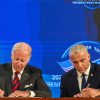Does America’s freedom and liberty last only as long as its morality?
The concept of the inalienable interdependence of constitutional order and Christian virtue was not just a characteristic of our Founding Fathers. It has continued to be emphasized throughout our history.
Take Noah Webster for example. He is considered the “Father of American Education.” He was the publisher of The American Dictionary of the English Language in 1828. And concerning the importance of Christianity, he wrote these words: “In my view, the Christian Religion is the most important and one of the first things in which all children, under a free government, ought to be instructed… no truth is more evident to my mind than that the Christian Religion must be the basis of any government intended to secure the rights and privileges of a free people.”
John Quincy Adams was the sixth President of the United States. He also served as an American diplomat, and as a member of the House and Senate. On the occasion of the celebration of the 45th anniversary of the Declaration of Independence, he declared: “The highest glory of the American Revolution was this: it connected in one indissoluble bond the principles of civil government with the principles of Christianity.”
Daniel Webster served as a United States Senator from Massachusetts and as Secretary of State. Here are his words concerning Christianity and government: “No truth is more evident to my mind than that the Christian religion must be the basis of any government intended to secure the rights and privileges of a free people. To preserve the government we must also preserve morals. Morality rests on religion; if you destroy the foundation, the superstructure must fall. When the public mind becomes vitiated and corrupt, laws are a nullity and constitutions are waste paper.”
William McGuffey was an American educator and author of the McGuffey’s Reader, first published in 1836. He observed: “The Christian religion is the religion of our country. From it are derived our prevalent notions of the character of God, the great moral governor of the universe. On its doctrines are founded the peculiarities of our free institutions.”
In 1838 the New York State Legislature declared: “This is a Christian nation. Ninety-nine hundredths, if not a larger proportion, of our whole population, believe in the general doctrines of the Christian religion. Our government depends… on that virtue that has its foundation in the morality of the Christian religion.”
In 1892 in the case of United States vs. Church of the Holy Trinity, the Supreme Court of the United States expressed these words: “No purpose of action against religion can be imputed to any legislation, state or national, because this is a religious people. This is historically true. From the discovery of this continent to the present hour, there is a single voice making this affirmation. We are a Christian people, and the morality of the country is deeply engrafted upon Christianity.”
Calvin Coolidge served as Governor of Massachusetts and Vice President of the United States before he was elected to serve as our 30th President. He was known as “Silent Cal” because he seldom expressed himself about anything. But he had some prophetic words about the importance of the Christian faith to the continuing existence of our nation, he wrote, “The foundations of our society and our government rest so much on the teachings of the Bible that it would be difficult to support them if faith in these teachings would cease to be practically universal in our country.”
In 1931 The United States Supreme Court, in the case of United States v. McIntosh, made this proclamation: “We are a Christian people, according to one another the equal right of religious freedom, and acknowledging with reverence the duty of obedience to the will of God.”
Peter Marshall was a Scottish-American, a preacher, who served as pastor of New York Avenue Presbyterian Church in Washington, D.C., he is often referred to as “The Church of the Presidents,” Peter Marshall also served as Chaplain of the United States Senate. In a prayer offered before the Senate in 1947 he said: “May it be ever understood that our liberty is under God and can be found nowhere else… We were born that way, as the only nation on earth that came into being for the glory of God and the advancement of the Christian faith.”
Earl Warren served as Governor of California and was the 14th Chief Justice of the United States Supreme Court. In a Time magazine interview conducted in February of 1954, shortly after President Eisenhower had appointed him as Chief Justice, he made this observation about our Christian heritage, he said, “I believe no one can read the history of our country without realizing that the Good Book and the spirit of the Savior have from the beginning been our guiding geniuses… I believe the entire Bill of Rights came into being because of the knowledge our forefathers had of the Bible and their belief in it. I like to believe we are living today in the spirit of the Christian religion. I like also to believe that as long as we do so, no great harm can come to our country.”
Dwight Eisenhower served as Supreme Commander of the Allied Forces in Europe during World War II. He also served two terms as our 34th President. He made this observation about the relationship between religion and government: “Without God there could be no American form of government, nor an American way of life. Recognition of the Supreme Being is the first and the most basic expression of Americanism.”
Ronald Reagan, our 40th President, expressed a similar sentiment when he proclaimed: “America needs God more than God needs America. If we ever forget that we are “One Nation under God,” then we will be a Nation gone under.”
Well as you can see from the survey of expressions concerning our nation’s Christian heritage, that heritage has been recognized and lauded by our leaders from the beginning until the latter part of the 20th Century. It has only been in recent years that this important heritage has been denied and disparaged.
A Foreigner’s Perspective
Even foreigners who visited the country recognized the significance of our Christian heritage. Take, for example, the French historian, Alexis de Tocqueville who visited the United States in the early 1830’s. In 1835 he published the first of a two volume study of this nation, titled, Democracy in America. He revealed that the intertwining of Christianity with government was very surprising to him.
He wrote these words, “Upon my arrival in the United States, the religious aspect of the country was the first thing that struck my attention; and the longer I stayed there, the more did I perceive the great political consequences resulting from this state of things, to which I was unaccustomed. In France I had almost always seen the spirit of religion and the spirit of freedom pursuing courses diametrically opposed to each other; but in America I found that they were intimately united, and that they reigned in common over the same country. The Americans combine the notions of Christianity and of liberty so intimately in their minds, that it is impossible to make them conceive the one without the other.”
In the fourth segment of this series on the Christian heritage of America, we will see how biblical precepts were infused into America’s founding documents by its constitutional framers.










I have researched Toquevilles comments and have not been able to find them. Do you have a source?